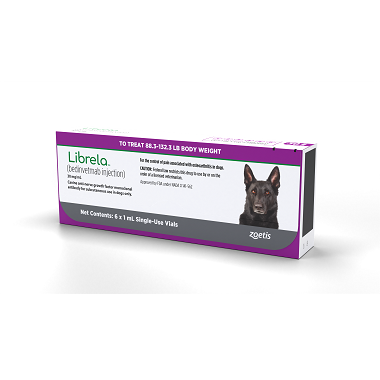Key Takeaways
- Many pet parents report positive results for a new drug to treat osteoarthritis in dogs.
- The drug – Librela – is administered by a monthly injection.
- Librela may have side effects and is not for all dogs, so pet parents should talk to their vet about whether it’s appropriate for them.
Table of Contents
What is Librela?
Librela, a new drug designed to treat osteoarthritis in dogs, is being praised as a “miracle drug” by some pet parents who say it has dramatically improved their pet’s activity and comfort level.
However, the drug does have some side effects and risks and has not been studied long-term, so pet parents need to be aware of the trade-offs.
Librela was approved in the U.S. by the Federal Drug Administration (FDA) last May and is now widely available through veterinarian’s offices. Manufactured by Zoetis, a leading animal health company, it is the first injectable drug to be approved for the treatment of osteoarthritis.
Osteoarthritis is extremely common in dogs, with one study suggesting 40 percent of dogs will develop it.
How does the Librela injection work?
As PetMD explains, with osteoarthritis, cartilage breaks down in the joints, which causes the bones to rub together and cause pain. A compound in the drug binds to a protein messenger called nerve growth factor (NGF), which blocks its ability to communicate pain signals to the brain, preventing the dog from feeling pain.
In two clinical studies conducted in the U.S. and Europe with 559 dogs, Librela was shown to reduce canine arthritis pain in 50-57 percent of dogs. However, 36 percent of pet parents whose dogs were given a placebo also reported improvement, suggesting people might have imagined some of the gains.
Reducing pain led to increased activity and improved quality of life for those receiving the shots. Librela works differently than pain relievers often prescribed for osteoarthritis since it blocks the source of the pain, Zoetis says on their website. The drug does not help reduce inflammation, which is what causes pain.
One pet parent posted on a dog-focused Facebook group that the drug had been life-saving to her dog.
“My rescue dog has terrible arthritis, to the point she crawled to get to the sofa and cried while she did it. She goes in once a month for a Librela injection. She now jumps on the sofa, plays with the Frenchie several times a day, and believes she is tough enough to take on all the deer around here. And she will let me brush her again, no wincing in pain. She has had three shots, and she is like a three-year-old again,” Earlene posted.
Safety considerations
In general, veterinarians who have been prescribing Librela consider it safe and effective, said the American Animal Hospital Assoc. (AAHA). While it’s new in the U.S., European veterinarians have been prescribing it for over two years. European vets, who distributed 4.6 million doses, gave the treatment an overall satisfaction rating of 8.6 out of 10, the highest rating of any osteoarthritis medication they evaluated.
“The availability of an effective, non-NSAID (pain medication) monthly treatment for canine osteoarthritis pain is an exciting advance for everyone who cares about improving the quality of life for dogs, owners, and veterinary professionals alike,” the AAHA says.
Dissenting views on Librela
Librela has some limitations and side effects, and some vets say it should be used only as a last resort to improve a dog’s quality of life.
Writing in Dogs Naturally magazine, British veterinarian Dr. Edward Bassingthwaighte says he is cautious about prescribing Librela because he’s concerned the way Librela blocks a protein that plays a role in the immune system could cause other health problems for dogs, such as autoimmune disease.
He also believes the drug becomes less effective over time while still potentially causing unintended harmful consequences. He says some dogs on Librela also tend to overdo it when their pain is relieved and can injure themselves.
Dr. Zac Pilossoph, a holistic vet and consulting vet to Healthy Paws, says most vets he speaks to do not have the same reservations about Librela. However, he warns that since the drug is so new, the long-term effects are not well understood.
“Unfortunately, it takes years to know of any impacts to overall health, and you need to be looking for changes. Besides the list of possible side effects, pet parents need to be aware of any changes to the kidneys. That requires seeking out bloodwork and urine testing regularly to be sure the organs remain healthy,” Dr. Pilossoph said.
Limitations and possible side effects for Librela
Zoetis says the drug should only be used on dogs over one year old. Accidental or self-injection could cause a severe allergic reaction in humans, but since veterinarians inject the drug, this should not impact pet parents. Librela should not be prescribed to breeding, pregnant or lactating dogs or dogs with a known sensitivity to bedinvetmab, the active ingredient in Librela.
In the clinical studies, these were the most common adverse reactions in dogs:
- Urinary tract infections (UTIs)
- Bacterial skin infections
- Dermatitis (an allergic reaction on the skin)
- Increased blood urea nitrogen
- Lethargy
- Anorexia
- Lameness
Dr. Pilossoph said the secondary infections as a side effect are a bit mysterious. If the drug suppresses normal immune function, allowing normal bacteria to overgrow or invade the body, that’s a concern.
“It’s interesting and something pet parents need to be monitoring (as well as the vets),” he said.
If you are considering Librela, talk to your vet about possible side effects and whether it suits your pet.
Summary
Librela is a promising new treatment for dogs experiencing joint pain, but it has some cautions and limitations. Much is still unknown since there have not been long-term studies. Pet parents should talk to their vet about osteoarthritis treatments, including Librela.
The cost of Librela would be covered by Healthy Paws as long as the arthritis is not a pre-existing condition. Healthy Paws policies cover any FDA-approved drug if prescribed by a licensed veterinarian.












